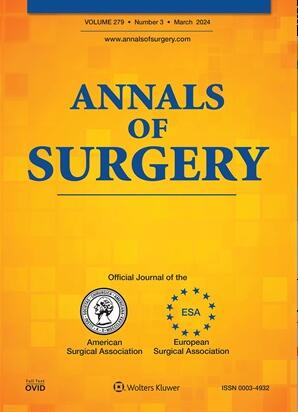Preoperative Patient Education on Opioid Use and Pain after Surgery: A Randomized Trial.
IF 7.5
1区 医学
Q1 SURGERY
引用次数: 0
Abstract
OBJECTIVE To evaluate the impact of preoperative analgesic education on postoperative opioid consumption, pain scores, and patient satisfaction with analgesia. BACKGROUND Effective postoperative pain management is crucial for patient recovery and satisfaction, yet opioid use poses risks of tolerance and addiction. Preoperative patient education offers a potential avenue to mitigate opioid reliance and improve pain management outcomes. METHODS This single-center randomized controlled trial was conducted at the Cleveland Clinic Main Campus between October 2021 and October 2023. Adult patients scheduled for hip arthroplasty or laparoscopic-assisted abdominal surgery with an ASA physical status of 1-4 were eligible. Patients with a history of prolonged opioid use, planned regional block or epidural analgesia, or limited English fluency were excluded. Participants were randomized 1:1 to receive either an analgesic educational video or a generic video about surgery and hospitalization. The primary outcome was opioid consumption during the initial 72 postoperative hours. Secondary outcomes included time-weighted average pain scores and patient satisfaction with analgesia. RESULTS Among 957 analyzed patients, preoperative analgesic education did not significantly reduce opioid consumption (adjusted ratio of geometric means, 1.01; 95% CI, 0.86 to 1.18; P = 0.890) or improve pain scores (adjusted mean difference, -0.1; 95% CI, -0.3 to 0.2; P = 0.617). Patient satisfaction scores also did not differ significantly between groups (adjusted mean difference, -0.1; 95% CI, -0.3 to 0.2; P = 0.611). CONCLUSIONS Preoperative analgesic education did not result in clinically meaningful reductions in opioid consumption or improvements in pain management outcomes. Further research may explore more intensive educational interventions to optimize postoperative pain management strategies.关于阿片类药物使用和术后疼痛的术前患者教育:随机试验
目的评价术前镇痛教育对术后阿片类药物使用、疼痛评分和患者镇痛满意度的影响。背景:有效的术后疼痛管理对患者康复和满意度至关重要,然而阿片类药物的使用存在耐受性和成瘾的风险。术前患者教育为减轻阿片类药物依赖和改善疼痛管理结果提供了潜在的途径。方法该单中心随机对照试验于2021年10月至2023年10月在克利夫兰诊所主校区进行。ASA身体状态为1-4的成人髋关节置换术或腹腔镜辅助腹部手术纳入研究对象。排除有长期阿片类药物使用史、计划局部阻滞或硬膜外镇痛或英语流利程度有限的患者。参与者以1:1的比例随机分配,接受镇痛教育视频或关于手术和住院的一般视频。主要结局是术后72小时内阿片类药物的消耗。次要结局包括时间加权平均疼痛评分和患者对镇痛的满意度。结果在所分析的957例患者中,术前镇痛教育并未显著减少阿片类药物的使用(经几何平均校正比,1.01;95% CI, 0.86 ~ 1.18;P = 0.890)或改善疼痛评分(调整后平均差值为-0.1;95% CI, -0.3 ~ 0.2;P = 0.617)。两组患者满意度评分也无显著差异(校正平均差为-0.1;95% CI, -0.3 ~ 0.2;P = 0.611)。结论:术后镇痛教育并没有导致阿片类药物用量的减少或疼痛管理结果的改善。进一步的研究可能会探索更密集的教育干预来优化术后疼痛管理策略。
本文章由计算机程序翻译,如有差异,请以英文原文为准。
求助全文
约1分钟内获得全文
求助全文
来源期刊

Annals of surgery
医学-外科
CiteScore
14.40
自引率
4.40%
发文量
687
审稿时长
4 months
期刊介绍:
The Annals of Surgery is a renowned surgery journal, recognized globally for its extensive scholarly references. It serves as a valuable resource for the international medical community by disseminating knowledge regarding important developments in surgical science and practice. Surgeons regularly turn to the Annals of Surgery to stay updated on innovative practices and techniques. The journal also offers special editorial features such as "Advances in Surgical Technique," offering timely coverage of ongoing clinical issues. Additionally, the journal publishes monthly review articles that address the latest concerns in surgical practice.
 求助内容:
求助内容: 应助结果提醒方式:
应助结果提醒方式:


